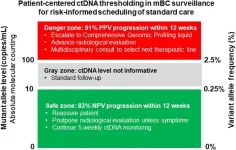(Press-News.org) Remember when 2°C of global warming was the doomsday scenario? Well, we're now staring down the barrel of something much worse. From the fish on your plate to the weather outside your window, everything's about to change.
A new study by an international team of researchers, including Jackie Dawson, full professor, Geography, Environment and Geomatics at the University of Ottawa’s Faculty of Arts, underscores the grave risks posed by insufficient national commitments to reducing greenhouse gas emissions.
“Our findings reveal that the risk of reaching 2.7°C of warming is substantial and that there is not a single sector in society that will remain untouched,” explains Professor Dawson who is also a tier 1 Canada Research Chair in the Human and Policy Dimensions of Climate Change. “From marine ecosystems to local infrastructure, the cascading impacts will affect every individual.”
This comprehensive assessment focused on the global Arctic, analyzing existing studies and climate model outputs to highlight the implications of rising temperatures. The research underscores that current nationally determined contributions (NDCs) — the promises made by nations under the Paris Agreement — will not suffice to achieve the 2°C target, which is the threshold marking a known tipping point beyond which widespread and severe global impacts are expected. Without substantial increases in these commitments, a future characterized by extreme temperatures and profound ecological disruptions appears unavoidable. This also suggests that scientific and policy efforts to understand the future risks of climate change need to now consider what a +3 or +4 degree world means.
As the Arctic continues to warm at nearly four times the global average, researchers noted that the region could become virtually ice-free during summer months, leading to devastating effects on marine ecosystems and the livelihoods they support as well as increased geopolitical and industrial pressures in the region. The study also illustrates how severe climate changes can exacerbate pre-existing vulnerabilities, particularly for Indigenous peoples and communities that rely on these ecosystems for livelihood and well-being.
These findings call for urgent action to reduce greenhouse gas emissions, reflecting a belief within the scientific community that bold, collaborative efforts can still avert the worst impacts of climate change. “We must prioritize investments in sustainable practices and climate adaptation strategies to protect our environment and our collective future,” Professor Dawson emphasizes.
As global temperatures inch closer to critical thresholds, this research serves as a wake-up call for individuals and nations alike to reassess their commitments to climate action and strive for meaningful change.
The review titled “Disappearing landscapes: The Arctic at +2.7°C global warming” was published in the journal Science.
END
Arctic study urges stronger climate action to prevent catastrophic warming
2025-02-24
ELSE PRESS RELEASES FROM THIS DATE:
New technique to measure circulating tumor DNA in metastatic cancer may improve disease progression surveillance and patient outcomes
2025-02-24
Philadelphia, February 24, 2025 – In metastatic cancer surveillance, monitoring the actual concentrations of circulating tumor DNA (ctDNA) may be critical. Researchers showed that absolute ctDNA concentration thresholds can be defined to rule out or predict impending cancer progression. They introduce a dual threshold model in a novel study in The Journal of Molecular Diagnostics, published by Elsevier, that may improve cancer surveillance, patient stratification, and risk-informed, personalized treatment by providing more accurate and timely assessment of disease progression.
Lead ...
One day of sleep deprivation can alter your immune system and increase inflammation
2025-02-24
New research reveals insight into the impact sleep quality has on a person’s immune system, and how it could be linked to the development of diseases such as obesity, diabetes, and cardiovascular diseases.
The study, published in The Journal of Immunology, found that even a single night of 24-hour sleep deprivation in young, lean, and healthy individuals altered the profile of immune cells that help regulate the immune system to resemble that of individuals with obesity - a condition known to drive chronic inflammation. This suggests that the immune system is highly sensitive to sleep and may adapt rapidly to changes in sleep pattern. ...
Study shows primary care and telehealth can deliver life-changing diabetes care
2025-02-24
Researchers at The University of Colorado Anschutz Medical Campus and colleagues at Massachusetts General Hospital, have found that people with diabetes can achieve the same positive results using advanced insulin technology when trained by their primary care providers (PCPs) or through telehealth as they would by seeing a specialist in person.
The study’s findings, which focused on Type 1 diabetes, are a major step forward in expanding access to cutting-edge care for people with diabetes, especially for those living in rural ...
The brain’s map of space: A new discovery about how our brains represent information
2025-02-24
A new study reveals how the brain’s "place cells" create internal maps to help us navigate. These specialized neurons, found in the hippocampus, were once thought to rely on precisely ordered patterns for spatial coding. However, researchers have found that their activity, which appears disordered in large spaces, actually follows universal mathematical principles. This surprising discovery suggests that randomness, not strict organization, is key to how our brains encode information about our experiences. The findings could reshape our understanding of brain function ...
AI to diagnose invisible brain abnormalities in children with epilepsy
2025-02-24
Scientists have developed an AI-powered tool that detects 64% of brain abnormalities linked to epilepsy that human radiologists miss.
MELD Graph is an AI tool that could drastically change the care for 30,000 patients in the UK and 4 million worldwide with one cause of epilepsy, researchers say.
The study, published today in JAMA Neurology by a team at King’s College London and University College London (UCL), shows how the tool significantly improves the detection of focal cortical dysplasia’s (FCDs) which is a leading cause of epilepsy.
Researchers say the tool will speed up diagnosis times, get patients the surgical treatment ...
COVID-19 vaccination and odds of post–COVID-19 condition symptoms in children ages 5 to 17
2025-02-24
About The Study: The results of this study suggest that mRNA COVID-19 vaccination may be a protective factor against post–COVID-19 condition in children following SARS-CoV-2 infection. These findings suggest benefits of COVID-19 vaccination beyond those associated with protection against acute COVID-19 and may encourage increased pediatric uptake.
Corresponding Author: To contact the corresponding author, Anna R. Yousaf, MD, email pgy6@cdc.gov.
To access the embargoed study: Visit our For The Media website at this link https://media.jamanetwork.com/
(doi:10.1001/jamanetworkopen.2024.59672)
Editor’s Note: Please see the article for additional ...
Sudden cardiac arrest among young competitive athletes before and during the COVID-19 pandemic
2025-02-24
About The Study: This cohort study found no increase in sudden cardiac arrest/sudden cardiac death in young competitive athletes in the U.S. during the COVID-19 pandemic, suggesting that reports asserting otherwise were overestimating the cardiovascular risk of COVID-19 infection, vaccination, and myocarditis. Many athlete cases shown in social media video montages occurred before the pandemic yet claimed COVID-19 infection or vaccination raised the risk of sudden cardiac arrest/sudden cardiac death.
Corresponding Author: To contact the corresponding author, Jonathan A. Drezner, MD, email jdrezner@uw.edu.
To access the embargoed study: Visit our For The Media website at this ...
Mortality among US physicians and other health care workers
2025-02-24
About The Study: The results of this cross-sectional study suggest that although physicians and most health care workers experienced lower mortality rates compared with the general population, this benefit did not fully extend to female individuals or racial and ethnic minority groups. Renewed efforts are needed to address health inequities within the health care workforce.
Corresponding Author: To contact the corresponding author, Anupam B. Jena, MD, PhD, email jena@hcp.med.harvard.edu.
To access the embargoed study: Visit our For The Media website at this link ...
Telemedicine adoption and low-value care use and spending among fee-for-service Medicare beneficiaries
2025-02-24
About The Study: In this cohort study, telemedicine adoption was associated with modestly lower use of 7 of 20 examined low-value tests (most point-of-care) and no changes in use of other low-value tests, despite a small rise in total visits that might offer more testing opportunities. Results suggest possible benefits of telemedicine and mitigate concerns about telemedicine contributing to increased spending.
Corresponding Author: To contact the corresponding author, Ishani Ganguli, MD, MPH, email iganguli@bwh.harvard.edu.
To access the embargoed study: Visit our For The Media website at this link ...
Researchers find telemedicine may help reduce use of unnecessary health tests
2025-02-24
Low-value care—medical tests and procedures that provide little to no benefit to patients—contributes to excess medical spending and both direct and cascading harms to patients. A research team from Mass General Brigham and their collaborators have found that telemedicine may help to reduce the use of low-value tests. The work is published in JAMA Internal Medicine.
“In theory, widespread adoption of telemedicine post-pandemic may influence low-value testing—such as Pap smears and prostate cancer screenings in older adults, and imaging scans for straightforward cases of low back pain,” said lead author Ishani ...

